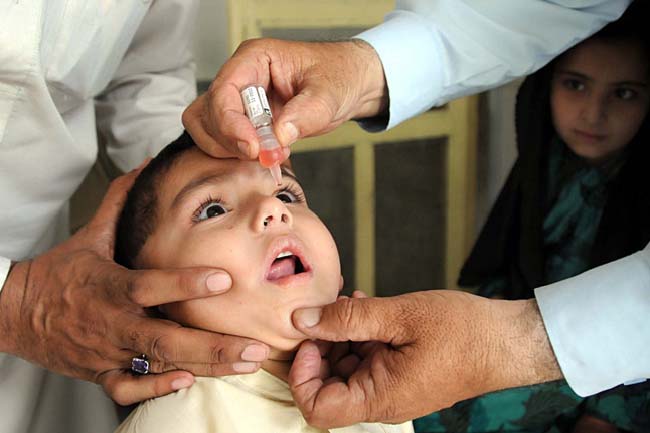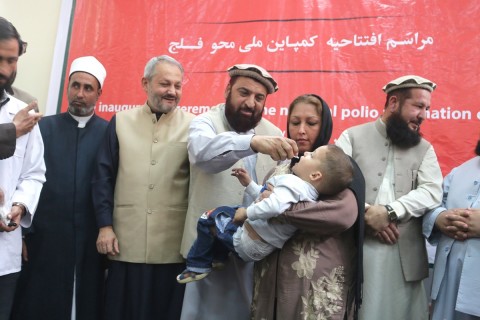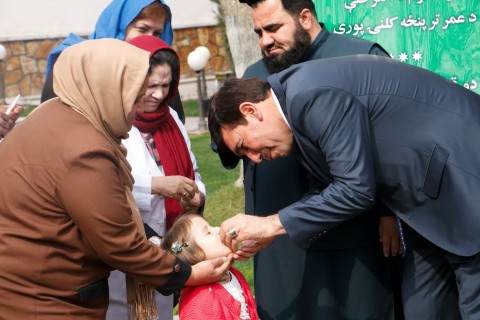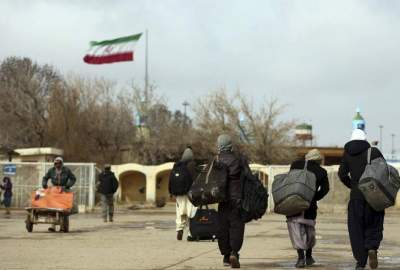The Ministry of Public Health in Afghanistan, together with UNICEF and WHO, launch its third national polio vaccination campaign for 2018. Over the next five days, around 9.9 million children under the age of five will be targeted for vaccination against polio across the country.
Publish dateTuesday 7 August 2018 - 10:27
Story Code : 168469
However, 1.2 million children from areas inaccessible to vaccination teams will miss the vaccine. These children will not be protected from the polio virus. The main provinces affected are Kandahar (117,640 children), Helmand (541, 839 children), Urozgan (119,406 children) and Zabul (146,513 children). The polio programme continues to look for ways to reach these children to protect them from permanent paralysis due to polio.
The nationwide campaign will be supplemented with vitamin A capsules, given to over 8.9 million children aged between six months to five years. Vitamin A helps to build a child's immunity and reduces the risk of diarrhea, respiratory infections and measles. Vitamin A supplements can improve a child's chance of survival by 12 to 24 per cent.
Dr. Ferozuddin Feroz, the Minister of Public Health said: "This campaign is a great opportunity for all parents to vaccinate and protect the children against this paralyzing disease. All families must use this opportunity and make sure that their all children including newborns and sick children are vaccinated. Neglecting in this regard, is indeed a big injustice to the right of children, because the only way for the protection of children from polio, is to vaccinate them in each round of polio vaccination campaigns."
Except Afghanistan, Pakistan and Nigeria, the poliovirus has been eradicated from all other countries, thanks to the polio vaccine. In 1988, when the Global Polio Eradication Initiative was founded so the world could end polio, there were 350,000 polio cases globally. Today, there are only 13 cases: 10 in Afghanistan and three in Pakistan. In Afghanistan, polio cases are largely in areas where insecurity and misperception about the vaccine creates obstacles for vaccination teams.
"Every child has the right to a healthy life. The polio vaccine protects children from permanent paralysis, which is a serious issue in Afghanistan. I urge every parent to open the door to vaccination teams to ensure their children are safeguarded from a virus that can cause severe disability," says UNICEF Deputy Representative Stefano Savi. "We believe that Afghanistan can make its people proud and eradicate polio, but this is only possible if every child is vaccinated. We call upon all parties to ensure health workers' safe, unconditional, and unimpeded access to vaccinate all children."
The national campaign will be conducted by 70,000 dedicated polio workers who will go to each house vaccinating children. Vaccinators visit each house because people can carry the polio virus, and it can only be eradicated if every child is protected through vaccination. Polio teams will revisit households where children were missed the first time the vaccinators visited to ensure that all children are vaccinated and protected.
"This campaign is a great opportunity for us to take yet another step towards a polio-free Afghanistan," says WHO Representative for Afghanistan, Dr Richard Peeperkorn. "Although the programme is reaching more children now than ever in past, we know that there is active transmission in some areas of the country. We need to maintain the gains made in population immunity in the pockets where polio still exists to ensure we can end it for good. I call on all Afghans to participate in our joint effort. The last steps are not easy, but they are possible," he adds.
The polio vaccine is safe and effective and has no side effects. It has been strongly endorsed by prominent local and international Islamic scholars. It is critical to vaccinate all children under five across the country to stop the virus, including all sick children and newborns, whose immunity is weak against this disease.
Source : Afghan Voice Agency(AVA)
avapress.com/vdcd9j0fnyt09o6.em2y.html
Top hits










